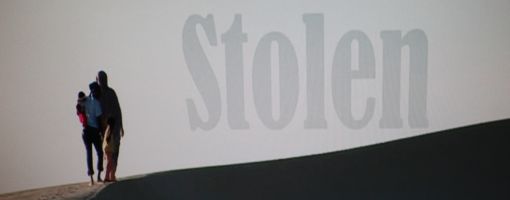
If the film makers behind this movie ever approach you for an interview, it would be wise to decline. Stolen - a movie that will be screened at a Norwegian film festival on Thursday - is full of fabricated subtitles. A normal Saharawi woman is portrayed as a slave despite no coverage for this claim in the movie.
One year before Stolen premiered in Australia, Fatim Salam Hamdi sent a letter to the producer of the movie, asking them not use her interviews.
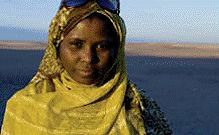
Fetim from Western Sahara - the main person of the documentary - is depicted as a slave even though the film carries no evidence of this claim.
All scenes of importance have been incorrectly subtitled or cross cutted in ways that evoke the image of her as a slave for her foster mother. Fetim says she feels offended by the movie and asks for it not to be screened in Norway.
The title of the movie 'Stolen' refers an alleged claim that Fetim as a child was kidnapped to a life of slavery. But those interviewed in the film remark that she has not been kidnapped at all. However, the subtitles in the interviews do not correspond with what the persons actually say. For example, when her mother and sister assert that she has never been kidnapped and that the claim of slavery is a lie, the film translates the scene with the opposite.
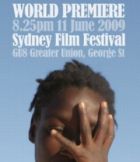
Different versions of the film
This article is written on the basis of 'Stolen' as it was screened on its world premiere on the Sydney film festival in 2009. All the errors are kept in the new version. A few of the minor subtitle errors have been changed, but not necessarily to the better. Here is an overview of some of the errors from the version distributed in 2010: http://www.vest-sahara.no/?cat=49&art=1531.
It was this former version of the film that was given to Moroccan authorities and shown on Moroccan TV, half a year before the premiere:
http://www.youtube.com/watch?v=bWRKpgkY_aY. The false translation is systematic throughout the movie. All the key scenes are framed to prove Fetim's life as a slave, but the segments that attempts to convey the impression that she was stolen from her biological mother, proves in reality the exact opposite if you listen to the local language, Hassaniya.
Last year, the Australian Western Sahara Association developed a report on the Australian-made film. They came to the conclusion that the movie contains blatant translation errors. The film makers claim to have used a certified translator, but none of his suggestions were ever taken into consideration. He has since taken a strong stance against the producers. Al Jazeera translators and Australian TV have also scrutinized the mistakes in the movie.
The translator that the film makers declare to have certified the movie has also said he has never approved the translation.
Which film festival will be the first to look into the subtitles of the movie together with a translator?
Here are some of the lies, manipulation and blunders from the movie, taken from the Australian report mentionned above. Parts of it are the findings of the Norwegian Support Committee for Western Sahara. In addition to all these mistakes, there are a number of other issues relating to the film. A number of the Saharawis appearing later in the film said they were paid to give statements.
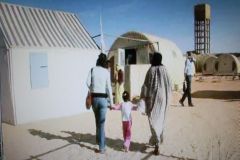
06.10: misrepresentation
Violeta and Fetim meet with the UN about the family visit. Much is made of the fact that Fetim is not on the list. This is irrelevant as Fetim's mother is registered in El Ayoun. The family visit goes ahead as planned.
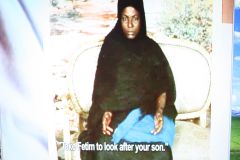
08:03 - mistranslated subtitles
Film translation:
Deido: Fetim's mother told me 'Take Fetim to look after your son'. It was God's will. Thanks to God.
Correct translation:
Deido: Fetim's mother told me 'Let Fetim go with you so she can play with your son'. This is the story. This is the truth.
08:26 -mistranslation
Deido gives the impression she does not really know, or is hiding something. The real soundtrack shows something else.
Film translation:
"As far as I remember, Fetim's family and mine were living together"
Correct translation:
“From the time I was small, Fetim's family and mine were living together”
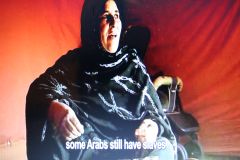
08:48 - 08:59 - mistranslation
She talks about the past, not the present. The talk is about how the two families met in the past.
Film translation:
“Here in the Sahara, we're all not the same. Some Arabs still have slaves.”
Correct translation:
“There were traditions among the Saharawi people. The Saharawis are not the same [meaning, there are differences between them]. The majority freed the people [that they had as slaves]. But others kept them [at the time].”
09:00: mistranslation
This is a key sentence showing Deido's apparent nature as slave owner - which is wrong.
Film translation:
Violeta: "Fetim is liberated?"
Deido: “Yes, I liberated her. She has three brothers, and I liberated them”
Correct translation:
Violeta: “Fetim is liberated?”
Deido: “Yes, she is free. She and her three brothers are free.”
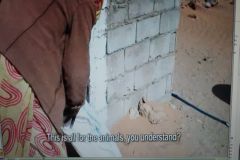
09.26: mistranslation and misrepresentation
The film in general shows Fetim doing domestic work for Deido (her adopted-mother) as evidence of "slavery."
This is a key scene, and the first of the only 2 scenes in the entire film in which one get's impression that Fetim is working on order from Deido. The goats in fact belong to Fetim - not to Deido. In fact, from the conversation in the film it appears that it was Deido who was going to feed the goats! The evidence that the goats actually belong to Fetim - and not Deido - is that Deido on the soundtrack asks how many goats Fetim really is going to feed. There is no reference to what time it is, as the film titles suggest.
Film translation:
Deido: Here take this it's for my goats. This is all for the animals, you understand?
Fetim: Did you give me the same food yesterday?
Deido: Yes. What time is it?
Fetim: Three o'clock
Deido: That's all, that food is good enough.
Correct translation:
Deido: I've got the food for the goats. It's better if you put it in a dry dish.
Fetim: Should I take her [the child] to the woman? (Deido was baby-sitting Fetim's
baby daughter).
Deido: You mean to the foreigner? Will she baby-sit her?
Fetim: Yes.
Deido: Are they only two?
Fetim: Three [goats].
Deido: That is fine, but put it in a dry dish.
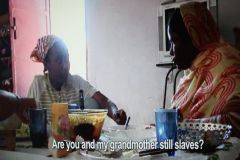
12.55: Mistranslation and deceptive editing
Violeta, Leil and Fetim are eating and having a conversation.
Film translation:
Leil: Are you and my grandmother still slaves?
Fetim: Don't ask.
Leil: What was it like for your mother?
Fetim: I was young. Didn't you already tell them the truth about slaves?
Leil: Then what should I tell her?
Fetim: When we were young the Arabs always beat us.
Correct translation:
Leil: She said someone told her that you were beaten when you were young
Fetim: What is this? - All the children when young get beaten.
(Cut)
Leil: What do I tell her?
Fetim: Tell her that they get beaten.
(Cut)
Fetim: Now you put yourself in a dilemma. Then, say slaves when young always get
beaten.
Leil: [in Spanish translating Fetim for Violeta] Yes, I also say that.
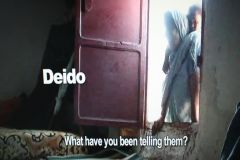
13.56: mistranslation and manipulation
The film depicts the following scene as an attempt by Deido to cover up the issue of slavery. Deido is actually talking about spending money on celebrations for the reunion. She wants to spend her own money but Leil is saying she doesn't need to because Violeta has offered to pay. However, the film-makers' offer is causing tension within the family.
Film translation:
Deido: What have you been telling them?
Leil: You talk to them.
Deido: They will believe you
Leil: What do you want me to tell them?
Deido: Tell them you always listen to me. And there is no difference between us blacks and
white.
Correct translation:
Deido: Tell her I am happy. It's a big day. I'm spending money wisely.
Leil: I didn't tell her anything special, we were just talking, What do I tell her?
Leil: But you'll spend all your money. What do I tell her?
Deido: What did she say? When you spend your money…
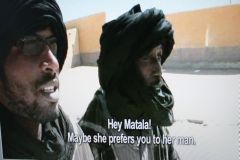
16.10 - mistranslated subtitles
Matala and his friend are chatting in the back of the truck as they drive around to buy a camel
Film translation:
Matala's friend: She is looking at you. Hey Matala! Maybe she prefers you to her man.
Matala: I don't think so.
Matala's friend: Shame on you - you can't get this girl.
Matala: She's just filming.
Matala's friend: Yeh, sure.
Correct translation:
Matala's friend: This man [Dan] really loves filming. He is concentrating on you.
Matala: He is listening to what you're saying.
Matala's friend: Come on, as if he can understand me.
Matala: But he's recording. And he will translate what you're saying.
Matala's friend: Let him translate it. What's the problem of me saying that he's watching you.
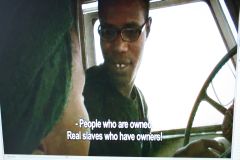
18.10: Misrepresentation and manipulative methods
Hamadoune and Leil wait in the car while Matala goes off to find a camel. Hamadoune who appears not to speak fluent Spanish because Leil is translating for him, suddenly says in fluent Spanish the words that are used to publicise the film, “slavery man to man is the saddest thing in the world.” Hamadoune and Leil giggle as they continue to talk about a very serious subject which seems an unlikely topic to be discussing while buying a camel for a big celebration.
21:40 - Inappropriate
Anyone with sensitivity to the culture of the Sahrawis would certainly not publish this clip of Fetim preparing herself for the party, without very clear prior permission. This has not been given.
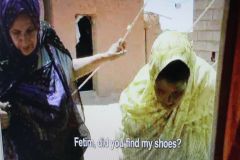
23.59: Mistranslation and misrepresentation
Embarka is about to arrive. The subtitles suggest that rather than allow her to welcome her mother, Deido orders Fetim to find her shoes. The scene is a crucial element in presenting Fetim as a slave. Before the false subtitles are presented, the narrator says with a shocked voice: "I couldn't believe it with Fetim jumped up to look for Deido's shoes. Her mother and sister had only been there for 10 minutes".
Film translation:
Deido: Where are my shoes? Fetim, did you find my shoes?
Fetim: They are over there.
Correct translation:
Deido: Have we got mint [for tea]? Have you given mint to of the women [who are making tea]. Do we have two tea-trays or three?
Fetim: It's over there.
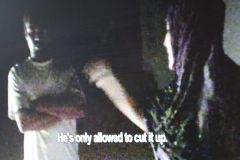
24.29: Misrepresentation
We are told by the narration that Matala is not allowed to kill the camel as that is “an honour reserved for an Arab”. This is not factually correct. The entire scene is misrepresented.
What happened - and what Deido is trying to explain in this sequence - is that Matala told Deido that he has never killed anything before. This is not unusual because in Sahrawi society, it is the older experienced men who slaughter animals. Deido wanted to make sure that either someone with experience kills the camel or if Matala insisted, someone older should go with the young men to show them how to do it. During the scene, one of Matala's friends tells Deido that Violeta says she owns the camel and that she insists that Matala kills it.
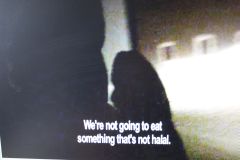
The part of the Halal is never stated.
The translation of what Matala and his friends were saying is incorrect.
Film translation:
Young man 1: Let's go leave them here.
Young man 2: Are you coming with us.
Correct translation:
Young man 1: Are you going to carry the foreigners on your backs?
Young man 2: The foreigners don't need you. Come get away from these foreigners.
25.13: Manipulative film-making
A distressing and gruesome slaughter of the camel is filmed. Its neck is slit and blood drains onto the sand. The scene contributes to the depiction of Saharawi people as brutal and savage with the implication being that they were easily capable of slavery. It is an emotional technique designed to whip up anti-Arab sentiments as journalist Bob Ellis discussed in his article Robbed of the Truth (http://www.abc.net.au/unleashed/stories/s2598993.htm)
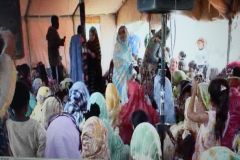
26.24: Misrepresentation
The film-makers say that Deido invited only her family and friends, not including her male cousin, Matala. This is misleading. As is customary, everyone was invited. However, that particular celebration was only for women.
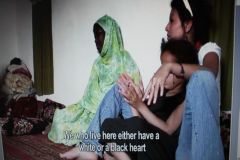
27.18: Manipulative film-making methods
Fetim's friend Jueda talks about everyone in the camps having a black or a white heart and that Fetim has a white heart. The conversation was setup by the film-makers. Fetim was asked by Violeta to visit her friend saying Jueda's daughter had been in a car accident. When she got there, Jueda and her daughter were perfectly fine. Fetim says that as soon as she realised it was a set-up, she got up and left. After Fetim has left Jueda says, "She does what Deido tells her."
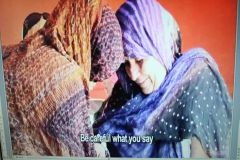
33.02: Mistranslation and misrepresentation
Deido and a woman chatting. The narration informs us that the woman is the wife of a Polisario official. No name is given of the wife or the husband. The womans face is not shown on camera. Deido's speech is not correctly translated.
Film translation:
Woman: Why are they always filming?
Deido: It doesn't matter.
Woman: Be careful what you say.
Deido: They know everything but they can't do anything.
Correct translation:
It is customary in the camps that if a family receives visitors from the occupied territory, people bring money and gifts to give to the family and the guests. The woman appears to be trying to give some money to Deido.
Deido: Take it back. I don't want it. Give it to her [Embarka]. I will not take a penny. I swear. I won't take it. The other woman is inaudible.
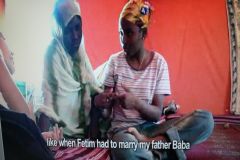
33:39 - misrepresentation
The context in this conversation is in past tense. The questions from Violeta is how the slavery situation WAS in the past, generations ago.
At 34:10 Leil states "like when Fetim had to marry my father Baba, he first asked if Fetim is liberated". This does NOT refer to any episode that had taken place between Fetim and Baba, but is stated in parallell to what the situation had been now had it happened in the past.
40.11 - implausible story
The film-makers say that Matala has told them to be careful of the tapes as the Polisario want to take them. So they decide to hide them in the desert surrounding the 27 February Camp. Cate Lewis has been to this camp several times. As the ground is rock hard in that area she asked the film-makers how they did this. They could not explain how they dug a hole in the hard ground or agree with each other's account of the event (Appendix I). It is also questionable that tapes could have survived the searing heat of the desert for several weeks. In the film they state the temperature in one day reached 45 degrees Celsius.
Producer Tom Zubrycki has later admitted the tapes were not buried in the sand as stated in the film:
http://www.screenhub.com.au/news/shownewsarticleG.asp?newsID=31764
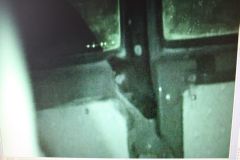
40.22 - fictitious scene
The film-makers claim that when they returned to Fetim's house the Head of Security and the Head of Protocol were there. They claim they were afraid so left. They think the Polisario might confiscate their tapes, so decide to bury the tapes in the desert. Then, as they are making their way through the desert at night, they claim they are suddenly surrounded by police and arrested. They then claim they are detained for several hours and that the Polisario threatened to confiscate their tapes.
What actually happened was that the film-makers left Fetim's house at approximately 9pm.
They phoned their producer Tom Zubrycki in Australia, who in turn contacted Kamal Fadel, the Polisario representative in Australia. In response to Zubrycki's concern for their safety, Fadel immediately contacted the camps.
Officials in the camps then spent eight hours looking for them. They were eventually found by the Head of Protocol, Brahim Mokhtar, inside the quarters of a Cuban medical team where they had spent the night. It was 5pm in the afternoon and still light. There was one other person with Brahim.
Because of the concern their disappearance had raised, Brahhim Mokhtar asked an independent witness to attend the debriefing. Two members of the UN mission, MINURSO agreed to be present at the meeting. The film-makers were asked to remain in his office until the UN officers arrived. A discussion took place and the film-makers asked to be taken from the camps to Tindouf by the MINURSO members.
This sequence of events is corroborated by emails from Tom Zubrycki and film-makers press release (Appendix B) in which they state, “After negotiations with the Polisario, we were allowed to leave with the UN officers. At all times the Polisario looked after us and afforded us every courtesy.”
41.56: misrepresentation
The film-makers claim that they are stuck in Tindouf and can't leave because the Polisario want their tapes, but they give no evidence. Tindouf is in Algeria and not part of the camps. There are only three flights a week and the filmmakers were simply waiting in a hotel for their flight, which they caught.
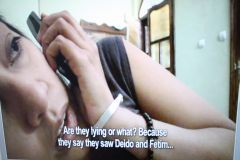
42.58: misrepresentation and manipulative techniques
Violeta is talking on the phone to Leil. Leil is obviously very distressed. The film implies that this is because Violeta has exposed slavery and Leil and her family are now in trouble. But rather she is upset because everyone has been worried and searching the camps for the film-makers. The subtitles suggest it's the films the police are looking for, not the film-makers. Leil says … “in trying to do good, you did bad.”
Leil is a young and impressionable girl. This conversation demonstrates the stress she has experienced by being involved in the making of the film. Using a child in this way in most films would be considered inappropriate and a form of exploitation.
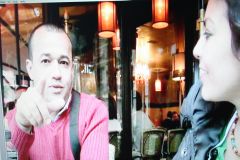
45.48 - Moroccan involvement
In Paris, Dan's voiceover tells us that they have been receiving calls from a Moroccan. Eventually they decide to meet him in case he can help them get to Mauritania to recover their tapes.
48.30 manipulation, payment for statements
The filmmakers meet up with several young men in Mauritania, who come allegedly to record their statements again in case the tapes are not recovered. The filmmakers film statements about slavery in the camps. Note that some of this footage is the same as that which they claim was Stolen in Morocco and ended up on YouTube.
These men have now retracted their statements, saying they were directed by the film-makers to say they were slaves. Their statements (filmed by independent film-maker Carlos Gonzalez can be viewed at http://media.smh.com.au/sahara-slavery-fiercely-denied-582354.html in which they say they were given money by the film-makers and by Moroccan officials.
The film-makers have acknowledged they paid for them to travel to and from Mauritania.
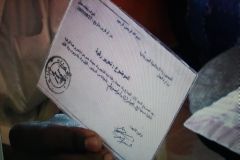
48.49 - misrepresentation
See on the top right of this document. There it says "Islamic Repucblic of Mauritania". The filmmakers present a "liberation from slavery" card to prove the existence of slavery in the Saharawi camps. However, no mention is made of the fact that the card has been issued by another country, Mauritania, and has nothing do to with the camps.
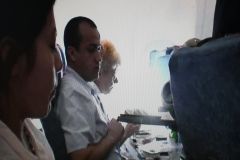
55.54 - Moroccan involvement
The Moroccan suddenly appears in Mauritania. He offers to send their tapes out of Mauritania in a diplomatic bag. Ayala and Fallshaw agree to fly with him to New York to do a press conference. The film-makers have acknowledged that their airfares to New York were paid by the Moroccan.
59.33 - Moroccan involvement and misrespresentation
The film-makers arrive in New York and meet up with the Moroccan to hold the press conference however they say the press conference doesn't take place. They then travel to Casablanca where they are given their tapes by the Moroccan. We are not told that a press conference does take place 3 months later.
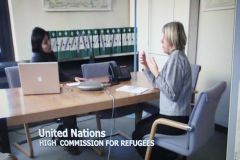
59.44 - manipulated Interview
The film-makers interview Deputy Director of the Africa and Middle East division of UNHCR, Ursula Aboubacar about UNHCR's position on slavery in the camps. The film-makers interrupt on several occasions making assertions about slavery in the camps and the interview is heavily edited. The transcript is attached (Appendix F).
Aboubacar stated in an email to the film-makers which has subsequently been released to the media that her interview was cut, manipulated and did not accurately represent the views of UNHCR. She also stated that the film-makers became aggressive when she refused to confirm the existence of slavery in the camps and that she did not sign a release form and was not shown the final film for approval despite her written requests. The High Commissioner for Refugees has also expressed similar concerns in writing (Appendix D).
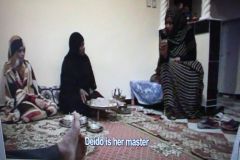
1.03.01 - mistranslated subtitles
Embarka and Fatma are back in the occupied territory. Violeta is talking to them. This is the third time in the movie it is denied that Fetim has been kidnapped by Deido when Fetim was a child.
Film translation:
Violeta: Why did Fetim go with Deido [Fetim's adopted mother]?
Fatma: Deido always wanted Fetim. And from there to the camps. There was nothing unusual about Deido taking Fetim. Deido is her master. And obviously controls her.
Correct translation:
Fatma to Violeta: Deido was visiting and Fetim left with her. When the March took place [the 1975 “Green March” invasion], they were in Hagounia. They went from there to the Front [camps]. And we stayed here because of the March.
Fatma then speaks to her family members: Bottom line, she is tracking the story of Fetim. Frankly, she thinks Deido owns her.
Embarka: Not true.
Fatma: Fetim told me that someone told her [Violeta] that Deido kidnapped Fetim. But she did not kidnap her.
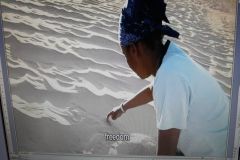
1.09.48 - misrepresentation
Leil writes in the sand “We Want Peace and Freedom.” This refers to the struggle for Independence but in the context of the film is clearly given the impression it refers to liberation from slavery. And which two words in the sand were not subtitled? “Sahara Libre”.
The film ends with a selective quote taken out of context from the Human Rights Watch report. The report does not state what is mentioned. Read the HRW yourself: http://www.hrw.org/en/reports/2008/12/19/human-rights-western-sahara-and-tindouf-refugee-camps
NY Check new Western Sahara poster!
“Try to Visit Western Sahara”…
The Security Council fails Western Sahara and international law
On 31 October 2025, a new resolution was adopted in the UN Security Council calling on the Saharawis to negotiate a solution that would entail their incorporation into the occupying power, Morocco.
Saharawis Demonstrate Against Trump Proposal
The United States has proposed in a meeting of the UN Security Council on Thursday that the occupied Western Sahara be incorporated into Morocco.
Skretting Turkey misled about sustainability
Dutch-Norwegian fish feed giant admits using conflict fishmeal from occupied Western Sahara. Last month, it removed a fake sustainability claim from its website.



